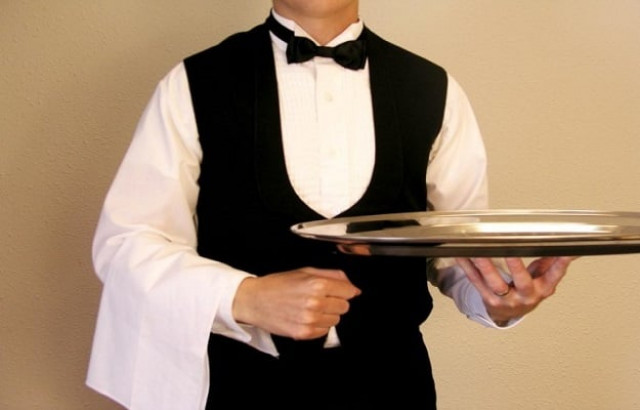Exclusive attire: ‘Common sense dictates that citizens should be free to wear black coats’
Plea requesting LHC to bar waiters from wearing lawyers’ ‘uniform’ dismissed

Plea requesting LHC to bar waiters from wearing lawyers’ ‘uniform’ dismissed. PHOTO: FILE
Justice Ayesha A Malik dismissed the petition saying that the court could not issue directions on what citizens could or could not wear.
Advocate Sarfaraz Ahmed had filed the appeal against an order by a single bench which had also dismissed his petition. Ahmed had said that he had asked the court to forbid employees of restaurants and hotels, especially waiters, from wearing the black suit worn by lawyers in court. He said that he had not asked the court to forbid all citizens from wearing the “lawyers’ uniform”, just employees in the hospitality industry. He said, however, the single bench had misinterpreted his petition by assuming he had meant all citizens.

The dress code for the bar and the bench is prescribed in the High Court Rules and Orders, General Chapter, under the head Dress of Advocates appearing in High Courts; and Supreme Court Rules 1980 in Part 1 under Order IV Rule 8 and Supreme Court (Court Dress and Mode of Dress) Order 1980.
He said the uniform worn by professionals including doctors and lawyers had an independent and distinct identity in society. Other examples of uniforms include ones worn by the armed forces, the police, Rescue-1122 staff and traffic wardens among others. He said there was no overlap of uniform for any other profession. The dress code represents the profession, he said. The idea is to allow people to connect a person with his profession by just looking at them, he said.
Similarly, the dress code for lawyers was exclusive. “We are always supposed to wear it in courts. We are not allowed to plead or argue cases before the court if we are not attired according to the dress code.”
Ahmed asked the court to set aside the single bench’s order and ban workers in the hospitality industry from wearing lawyers’ uniform. The statutory uniform was exclusively for the bench and the bar, he said.
While dismissing the previous petition, Justice Ijazul Ahsan had observed that the garb worn by lawyers and judges was neither a trade dress nor like the uniforms of the police or the armed forces. He said it was clear that uniforms were protected by statutes, laws, rules or regulation. The dress code for lawyers and judges was common apparel and without distinctive features and therefore could not be termed a uniform. He observed that it wasn’t protected by a statute either. Citizens are not and cannot be prohibited from wearing black suits, regardless of whether they work at an office or a hotel, or participate in a seminar or attend a dinner party, the judge had said.
Justice Ahsan had said that such a prohibition would not only be unenforceable but would also defeat common sense. He said the counsel for the petitioner had failed to convince the court that his rights were being infringed upon.
Published in The Express Tribune, July 7th, 2015.



















COMMENTS
Comments are moderated and generally will be posted if they are on-topic and not abusive.
For more information, please see our Comments FAQ